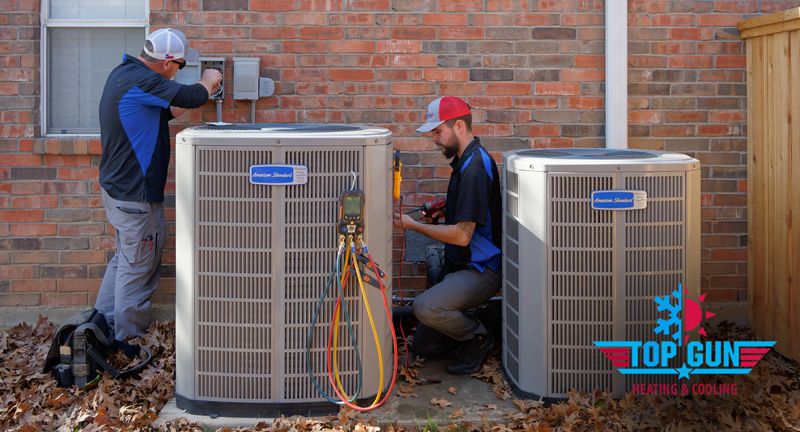
Why Is My Air Conditioner Freezing Up?
Why Is My A/C System Freezing Up?
You’ve probably already guessed this isn’t a normal part of the operation of your air conditioning system and you would be correct in that assumption. If you’ve never experienced this, the idea can seem far fetched. After all, not many people are used to seeing a block of ice surrounding their compressor on a 95-degree summer day. Air Conditioning and Refrigeration systems freeze for different reasons depending on what is impacting what part of the refrigeration cycle (see below) These reasons can be listed under 4 different categories; airflow loss, refrigerant loss, mechanical, and temperature.
The first reason for you’re a/c system freezing is probably the most common. The freon pressures in your system rely on the absorption of heat in the evaporator section. This is typically transferred from air that is pulled in from your house into the air handler unit and across the evaporator coil. With a loss of air flow comes a drop in temperature below freezing at the evaporator section causing the water molecules in the air to form frost on the indoor coil which eventually builds into a layer of ice. The most common cause for airflow loss are listed below.
- Dirty filter at the return air duct on the system, or too restrictive of a filter (filters have a MERV rating, the higher the rating the smaller the particle it will filter)
- Burned out Indoor Blower Motor, or Motor that has too weak of a capacitor to start the motor. Often times a humming noise can be heard at the air handler unit
- Bent, or Broken Blower Wheel unable to turn and provide airflow. A dirty blower wheel will often cause motors to fail prematurely and will not move enough airflow.
- A dirty evaporator coil, usually caused by the lack of a filter at the return, or too infrequent changing of the filter (very common) This requires the evaporator to be pulled and cleaned professionally
- Improperly sized duct work, crushed or collapsed duct, insulation blown loose in system blocking air flow. Improperly installed duct work
- Blocking of the return air grille either with furniture or other obstruction
- Too many Vents or Registers closed
The second category is refrigerant loss. This is another very common cause for a/c systems freezing over. Each system is charged with an exact amount of refrigerant or freon that is used to transfer heat from your home. Age of a system, improper installation, acidity of refrigerant, or manufacturing flaws can cause systems to leak refrigerant. The size and severity of the leak is situation dependent. Loss of pressure in the system cause the temperature of the refrigerant to drop below freezing temperatures and form ice on the evaporator coil and travel outside to the condenser via the copper lineset. In rare cases overcharging a system may result in no superheat and the air conditioning unit to freeze over.
Other causes of an air conditioning system freezing are mechanical related and are listed below.
- A clogged liquid line filter drier. Which is typically a result of a poor quality installation, and improper evacuation during installation of a central heating and air system.
- A kink in the liquid line, or restriction in the system at the TXV (thermostatic expansion valve) near the entrance to the evaporator coil.
- Liquid line valve not fully opened.
- A restriction in the metering device (see picture below) which can either be a fixed orifice, capillary tube system, or TXV with a faulty power head. This can also be related to poor installation practices and lack of filtering device installed in system.
The last cause for a air conditioning system freezing over is temperature. When we are referring to temperature in this circumstance we are typically talking about the outdoor ambient temperature. A low outdoor ambient temp can cause the pressures in the system to drop below normal and cause freezing of the air conditioner. This problem is typically resolved with a lockout device installed on the air conditioning unit by the manufacturer. Not all systems are equipped with this type of control though. Typically running you’re A/C system in outdoor ambient of below 60 degrees is not recommended. Freezing can also occur when the indoor temperature at the thermostat is set too low. This puts unnecessary wear and tear on the system. On a residential system the indoor temperature should not be set below 68-70 degrees unless equipped with controls that prevent a freezing over situation.
When the air conditioning system freezes over it can cause the Freon to return to the compressor in a liquid form and cause slugging of the motor. Modern scroll compressors are better equipped to handle this situation than older style units. However, it can still cause damage to the system and should be assessed by a professional if it ever occurs.
The friendly professionals at Top Gun Air can provide an honest assessment and leak detection service if needed. For scheduling of appointments check us out online. If you have questions regarding freezing of your system and would like to speak to one of our helpful, friendly staff, give us a call at (682) 214-0431. We hope you find this article informative and helpful.
